Before you even think about picking up the phone to a builder, the most important work happens right at your own kitchen table. Choosing the right partner for your rural build starts with a solid plan. You need to know exactly what you’re building and what you can realistically afford. Getting this right from the beginning is your single best defence against scope creep and budget blowouts down the track.
Define Your Vision and Lock In Your Budget
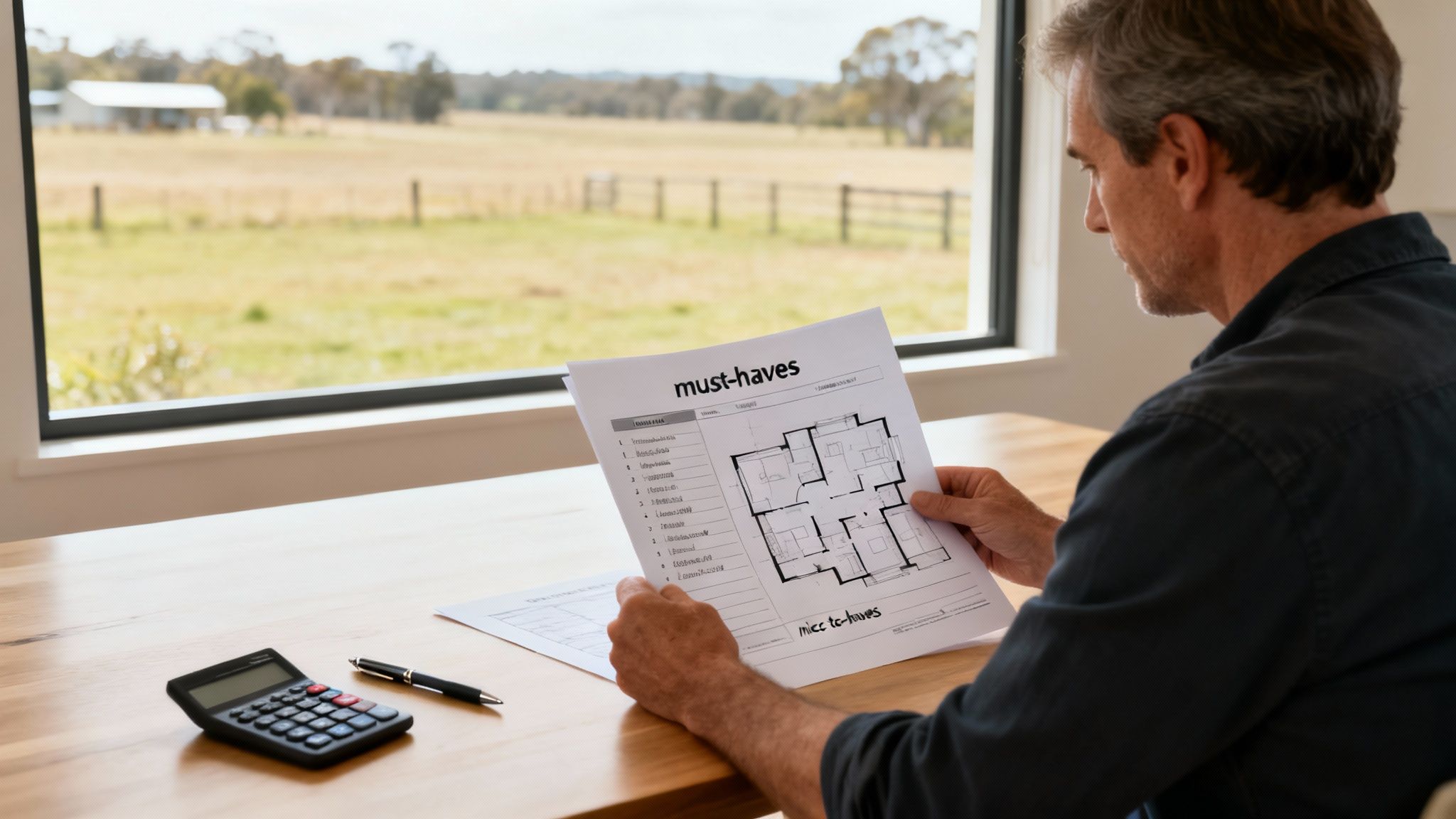
Jumping into a building project without a detailed brief is a bit like setting off on a long road trip with no map. You might get somewhere, but it probably won’t be where you intended, and the journey will be full of expensive wrong turns. To get an accurate quote and ensure everyone is on the same page from day one, you need to hand over a clear, detailed vision.
This isn't just about ticking boxes; a well-thought-out project brief becomes the foundational document that guides every single decision, from the slab to the final coat of paint.
Distinguish Between Needs and Wants
Start by grabbing a pen and paper and drawing a line down the middle. On one side, list your 'must-haves', and on the other, your 'nice-to-haves'. This simple exercise is invaluable because it forces you to prioritise what truly matters, making those tough decisions easier if the budget gets tight.
Your 'must-haves' are the absolute non-negotiables. For a rural property, this might look something like:
- Three bedrooms to fit the growing family.
- A mudroom with direct outdoor access – essential for farm life.
- Hard-wearing, waterproof flooring in the kitchen and hallways.
- A covered deck that captures the morning sun.
Then, your 'nice-to-haves' are the features you’d love but could live without. Think underfloor heating in the bathroom, a high-end stone benchtop, or extensive landscaping. This separation gives you a clear framework for budget discussions with potential builders.
Research Realistic Rural Building Costs
It’s crucial to understand that building costs in regional New South Wales can be a different beast compared to the city. Factors like material transport, labour availability, and tricky site access all play a part.
Do your homework by looking up online cost guides and chatting with local suppliers. Just remember that generic square-metre rates are only a starting point. Your final costs will hinge on your design's complexity, the quality of finishes, and any specific challenges your block presents. For a deeper dive, check out our guide on how to estimate house construction costs.
Pro Tip: Your budget must include a contingency fund of at least 10-15%. This isn’t a slush fund for adding 'nice-to-haves'. It's your safety net for the unexpected, like hitting rock during excavation or unavoidable supply chain delays.
The Australian construction industry is massive, with around 411,000 businesses operating in the sector as of 2025. That sheer number highlights why having a crystal-clear brief is so important—it’s your best tool for filtering through the crowd to find the right team for your project.
Create a Comprehensive Project Brief
Your project brief is where your vision and budget come together. It needs to be detailed enough for a builder to read it and know exactly what you want to achieve. A strong brief should always include:
- Project Overview: A short summary of what you're building and why.
- Must-Haves & Nice-to-Haves: Your prioritised lists.
- Budget: Your realistic, all-inclusive figure (including that contingency!).
- Inspiration: A collection of photos, sketches, or even Pinterest boards.
- Site Information: Key details about your property, especially access challenges.
Speaking of site access, it’s one of the biggest variables in a rural build. That’s why we have a 10 tonne 4×4 truck to bring in materials and supplies for the most remote properties around New South Wales. This allows us to bring in labour and materials where and when it's needed the most, overcoming the logistical hurdles that can bring other projects to a grinding halt.
Once you have this brief nailed down, you’re ready to start the search for your building partner with real confidence.
Vet Builders Like an Industry Insider
Once you’ve nailed down your vision and budget, the real detective work begins. A flashy website and a friendly voice on the phone are nice, but they don't mean much without the credentials to back them up. Vetting a builder isn't about being cynical; it’s about being smart and protecting what is likely a massive investment. This is where you filter out the pretenders and find a true professional.
For builds out in the country, this step is even more critical. You need someone who not only has the right paperwork but truly gets the unique challenges of working on remote properties—from navigating tricky access roads to planning for unpredictable weather. Your goal is to find a builder whose reputation is as solid as the foundations they pour.
The Non-Negotiable Paperwork Trail
Before you get carried away talking about design features and finishes, you have to verify the basics. Think of this as the foundation of your entire working relationship—if it’s weak, the whole project is at risk. There’s absolutely no room for compromise here.
Any legitimate builder in New South Wales should be able to provide these without hesitation:
- A Valid Contractor Licence: This is the big one. You can, and absolutely should, look up their licence on the NSW Fair Trading website to check its status, history, and any conditions. A valid licence proves they've met the state's minimum qualifications.
- An Active Australian Business Number (ABN): A quick search on the Australian Business Register will confirm their ABN is current. It's a basic sign that you're dealing with a legitimate, operating business.
- Proof of Insurance: At a minimum, they need Public Liability Insurance (to cover accidents and property damage) and Workers Compensation Insurance for their team. Don't just take their word for it; ask for the Certificate of Currency.
A Critical Safety Net: For any residential building work valued at over $20,000, your builder is legally required to provide you with evidence of cover under the Home Building Compensation (HBC) Fund. This protects you if the builder dies, disappears, or goes broke before finishing your project. Do not sign anything or hand over a deposit without it.
This initial check is your first line of defence. It quickly weeds out the cowboys and corner-cutters, ensuring you’re only dealing with builders who operate by the book.
To help you stay organised, we've put together a simple checklist. Systematically work through these items for every builder you're seriously considering.
Builder Vetting Checklist
| Verification Item | What to Look For | Why It Matters |
|---|---|---|
| Contractor Licence | Active status, correct name/business, no suspensions or disciplinary actions listed on the NSW Fair Trading register. | Confirms they are legally qualified and authorised to perform the work. |
| ABN Status | Check the Australian Business Register to ensure the ABN is active and registered for GST. | Verifies they are a legitimate, trading business and that invoices will be valid. |
| Public Liability Insurance | A current Certificate of Currency with at least $5 million in coverage (more for larger projects). | Protects you financially from accidental damage to your property or injury to a third party. |
| Workers Compensation | A current certificate confirming they cover their employees in case of workplace injury. | Ensures you aren't liable if a worker gets hurt on your property. |
| Home Building Compensation (HBC) | A certificate of insurance specific to your project for any work over $20,000. | Your legal safety net against non-completion due to builder insolvency, death, or disappearance. |
| Client References | A list of at least 3 recent clients with similar projects. | Provides real-world insight into their communication, quality, and professionalism. |
Having this information in hand gives you a clear, objective way to compare candidates and move forward with confidence.
Beyond the Paperwork: Talk to Past Clients
References are your window into a builder's real-world performance. Don't just accept a list of names—ask for recent clients and, if you can, people who had a project similar to yours. A builder who's proud of their work will have no problem connecting you with happy homeowners.
When you call them, dig deeper than just, "Were you happy with the work?". You want the full story. For a complete guide, check out these essential questions to ask your contractor before starting work.
Here are a few targeted questions to get you started:
- How was their communication? Were you kept in the loop on progress and any delays?
- Did the project stick to the timeline and the original budget?
- How did they handle the inevitable surprise issue or a change you requested?
- What was the quality of their subcontractors' work and the final finishes like?
- Have they been responsive to any little issues that popped up after they finished?
Listen closely. Sometimes what isn't said, or a moment of hesitation, can be just as telling as a direct answer.
See the Workmanship for Yourself
Seeing is believing. If at all possible, ask to visit a completed project. This is your chance to assess the quality of their workmanship up close, away from the flattering angles of a professional photograph.
Pay attention to the details that reveal true craftsmanship. Check the crispness of the paint lines, the precision of the tile work, the alignment of doors and windows, and the overall solid feel of the place. Does it feel like it was built with care and built to last? This firsthand look gives you tangible proof of a builder's standards.
Finally, never forget that logistics can make or break a rural build. At Awesim, we know from experience that getting materials and people to a remote site is half the battle. That’s why we have a 10 tonne 4×4 truck to bring in materials and supplies for the most remote properties around New South Wales, allowing us to bring in labour and materials where and when it's needed the most. This kind of in-house capability means we can get everything to your site when it's needed, ensuring your project isn’t held hostage by the tyranny of distance. A builder's equipment and logistical planning are just as important as their skills with a hammer.
Decoding Quotes and Understanding the Real Costs
Getting a few quotes back from builders can feel like you’ve hit a major milestone. After all that groundwork and vetting, you’ve finally got some real numbers to look at. But this is where the real work begins, because you need to learn how to read between the lines. I've seen it time and time again: the cheapest quote is almost never the best one.
A quote is much more than a final price. It’s a window into the builder’s professionalism, how well they've understood your vision, and their whole approach to the job. If you get a vague, one-page quote, consider it a serious red flag. What you need is a detailed breakdown that shows you exactly where every dollar is going, from the concrete for the slab right down to the doorknobs.
This infographic lays out the essential vetting process you should have already completed, ensuring you're only comparing quotes from genuinely qualified professionals.
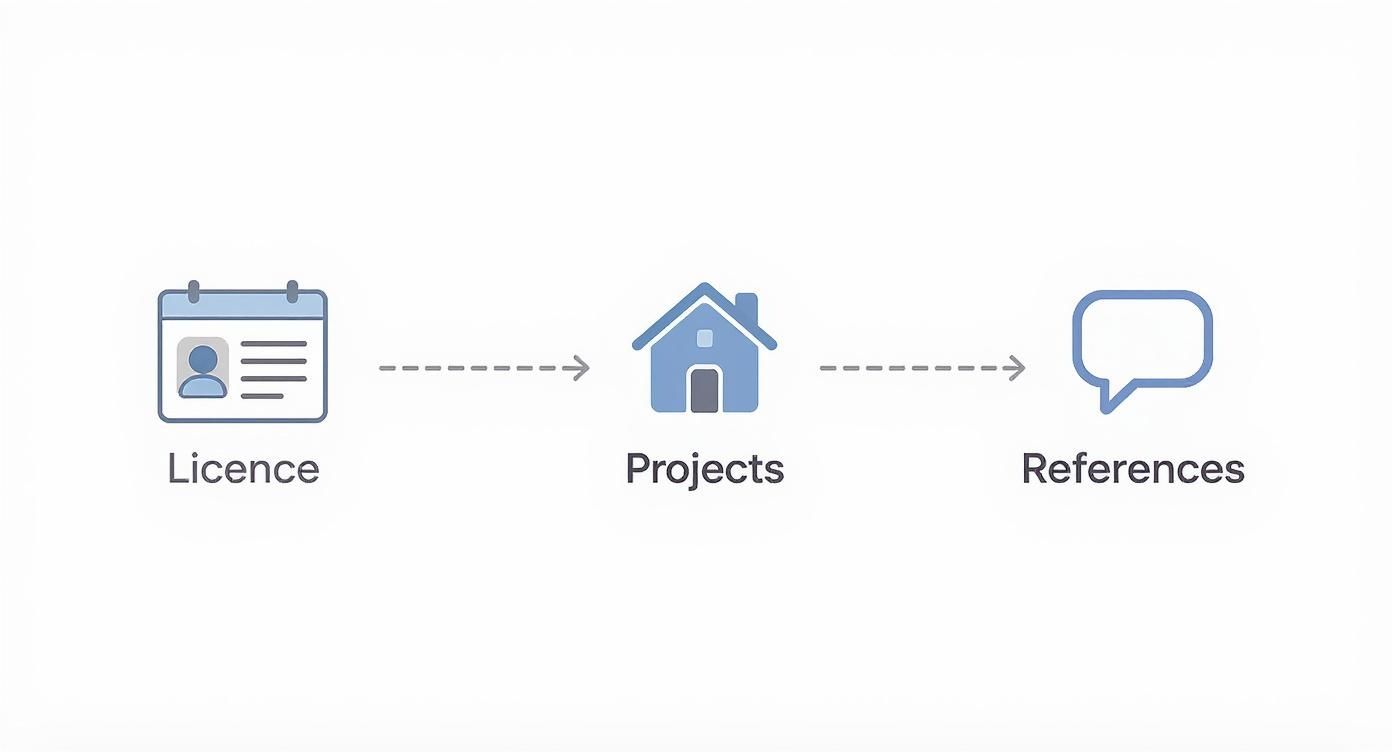
As the graphic shows, checking a builder's licence, looking at their past work, and speaking to their references are steps you take before you even get to the quoting stage. It's all about building confidence.
Fixed-Price vs Cost-Plus Contracts
When the quotes land on your table, they'll generally be structured in one of two ways: fixed-price or cost-plus. Both have their place, but one will likely be a much better fit for your rural project and your own tolerance for financial risk.
- Fixed-Price Contract: This is what most people are familiar with for home builds. The builder commits to completing the entire project for a set, total price. It gives you budget certainty, which is a huge relief for most clients. The catch? Any changes you decide to make mid-stream will require a formal—and often costly—variation.
- Cost-Plus Contract: With this model, you pay the actual cost of all labour and materials, plus a pre-agreed margin for the builder (the "plus"). It’s incredibly transparent and flexible, but it puts more of the financial risk on you, as the final cost isn't locked in from day one.
From my experience, most rural property owners find a fixed-price contract offers the best protection against budget blowouts, as long as your plans are thoroughly detailed from the outset.
Beware of Hidden Budget Busters
A builder’s quote will often include allowances for items that haven't been finalised yet. These are perfectly normal, but you have to understand what they mean to avoid some nasty surprises down the track.
Two key terms to get familiar with are:
- Prime Cost (PC) Items: This is a dollar allowance for specific fixtures and fittings—think taps, ovens, or tiles. If the builder has allowed $50 per square metre for your bathroom tiles but the ones you've fallen in love with are $85, that difference comes straight out of your pocket.
- Provisional Sums (PS): This is an educated guess for work where the final cost can't be known upfront, like excavation on a tricky block or potential rock removal. If the crew hits a massive granite boulder that wasn't anticipated, the cost to deal with it will exceed the provisional sum, and that extra expense is on you.
A good, experienced builder will use realistic allowances for PC items and will base their Provisional Sums on a proper site assessment. Don't be afraid to ask them how they arrived at those figures. If they seem unusually low, it might be a strategy to make the quote look more attractive than it actually is.
Comparing Quotes Apples-for-Apples
Whatever you do, don't just scan for the lowest number at the bottom of the page. You need to lay all the quotes out, side-by-side, and confirm that every builder has priced the exact same scope of work with the same quality of materials. This is where having a detailed project brief, like we talked about earlier, becomes invaluable.
I always recommend creating a simple spreadsheet. Compare the big-ticket items like excavation, framing, roofing, and internal finishes across each quote. If one is dramatically lower than the others, your job is to find out why. Did they miss something? Are they quoting on cheaper, inferior materials? This kind of meticulous comparison is your absolute best defence against unexpected costs later on.
With the total value of Australian building work hitting $38.9 billion in a recent quarter, it’s clear the industry is managing huge costs. This trend reinforces why demanding a detailed breakdown is so crucial for ensuring you get genuine value. You can dive deeper into Australian construction price trends to get a better feel for the market.
Finally, think about logistics, especially for a remote build. A single delayed delivery can grind the whole project to a halt and add thousands to your bill. This is where a builder's own resources can make a world of difference. For instance, we have a 10 tonne 4×4 truck to bring in materials and supplies for the most remote properties around New South Wales. This allows us to bring in labour and materials where and when it's needed the most, sidestepping the costly delays that plague so many rural builds. It’s a practical advantage that won't show up on a quote, but it has a massive impact on your budget and timeline.
Getting the Contract Right and Spotting the Red Flags
This is where the rubber meets the road. Your building contract is the single most important document you’ll sign. It’s not just paperwork; it’s the legal backbone of your entire project and protects what is likely one of the biggest investments you'll ever make.
A good contract lays out the roadmap for everything—timelines, payment stages, materials, and what happens when things don't go to plan. Getting this part wrong can lead to a world of pain, from budget blowouts to serious disputes. Think of the contract as a tool for creating clarity, not a hurdle to jump over. Any builder worth their salt will present a detailed contract and be happy to walk you through it. If they’re vague, rush you, or hand you a flimsy one-pager, that's your cue to be very, very careful.
What to Look For in a Building Contract
Before your pen even touches the paper, you need to be sure the contract is rock-solid. Most reputable builders in New South Wales use standard contracts from organisations like the Housing Industry Association (HIA) or the Master Builders Association (MBA). Whatever form it takes, make sure it nails down these key details:
- A Detailed Scope of Work: This needs to be crystal clear, referencing your plans and specifications. Vague descriptions like "install kitchen" are a recipe for disaster. It should list everything, down to the brand of taps and the type of door handles.
- The Price and Payment Schedule: The contract must state the total price and have a clear payment schedule. Critically, these payments should be tied to tangible milestones—think 'slab down', 'frame complete', 'lock-up stage'—not just arbitrary dates on a calendar.
- How Variations are Handled: Projects evolve. The contract needs a clear process for managing changes. It should spell out how you request a variation, how it's priced, and that it must be approved by you in writing before any work starts.
- A Realistic Timeline: Look for defined start and completion dates, along with key checkpoints. The contract should also address what happens if there are delays, whether they’re caused by you, the builder, or things no one can control, like a week of torrential rain.
- Dispute Resolution Clause: If disagreements pop up, how will they be handled? A good contract outlines a clear process, which usually starts with mediation through a body like NSW Fair Trading before anyone starts talking about lawyers.
Knowing these elements inside and out gives you the power to hold your builder accountable and ensures everyone is on the same page from day one.
A critical piece of the puzzle, especially for remote builds, is confirming the logistics are accounted for. We have a 10 tonne 4×4 truck to bring in materials and supplies for the most remote properties around New South Wales. This allows us to bring in labour and materials where and when it's needed the most, ensuring your project timeline isn’t derailed by access issues that can plague rural construction.
Red Flags You Simply Can't Ignore
Part of finding the right builder is knowing which ones to walk away from. As you get to the contract stage, certain behaviours should set off alarm bells. Don't let excitement or a desire to get started cloud your judgement here.
Trust your gut. If something feels off or a builder is making you feel pressured, it's often a sign of deeper issues. Keep a sharp eye out for these warning signs:
- Asking for Too Much Money Upfront: In NSW, the absolute maximum deposit a builder can legally ask for is 10% of the contract price. If they ask for more, it's not just a red flag—it's illegal.
- Vague and Ambiguous Terms: A contract peppered with fuzzy language like "standard quality finishes" or missing detailed specifications is a major problem. Every single detail should be clearly defined and written down.
- High-Pressure Sales Tactics: A builder who pressures you to sign on the spot with a "limited-time offer" is looking out for themselves, not you. You need time to review the contract properly, and you should always get a solicitor to look it over.
- Aversion to Writing Things Down: If a builder seems reluctant to put quotes, variation costs, or promises into a written document, run a mile. A handshake deal or a verbal agreement is worth very little when things go wrong.
- No Sign of Home Building Compensation (HBC) Cover: For any project over $20,000 in NSW, the builder must give you proof of this insurance before you pay a cent of the deposit. It’s non-negotiable.
Spotting these red flags isn’t about being cynical; it’s about being a smart, informed client. A transparent, thorough contract is the bedrock of a successful build and a good working relationship with your builder.
Master the Challenges of a Rural NSW Build
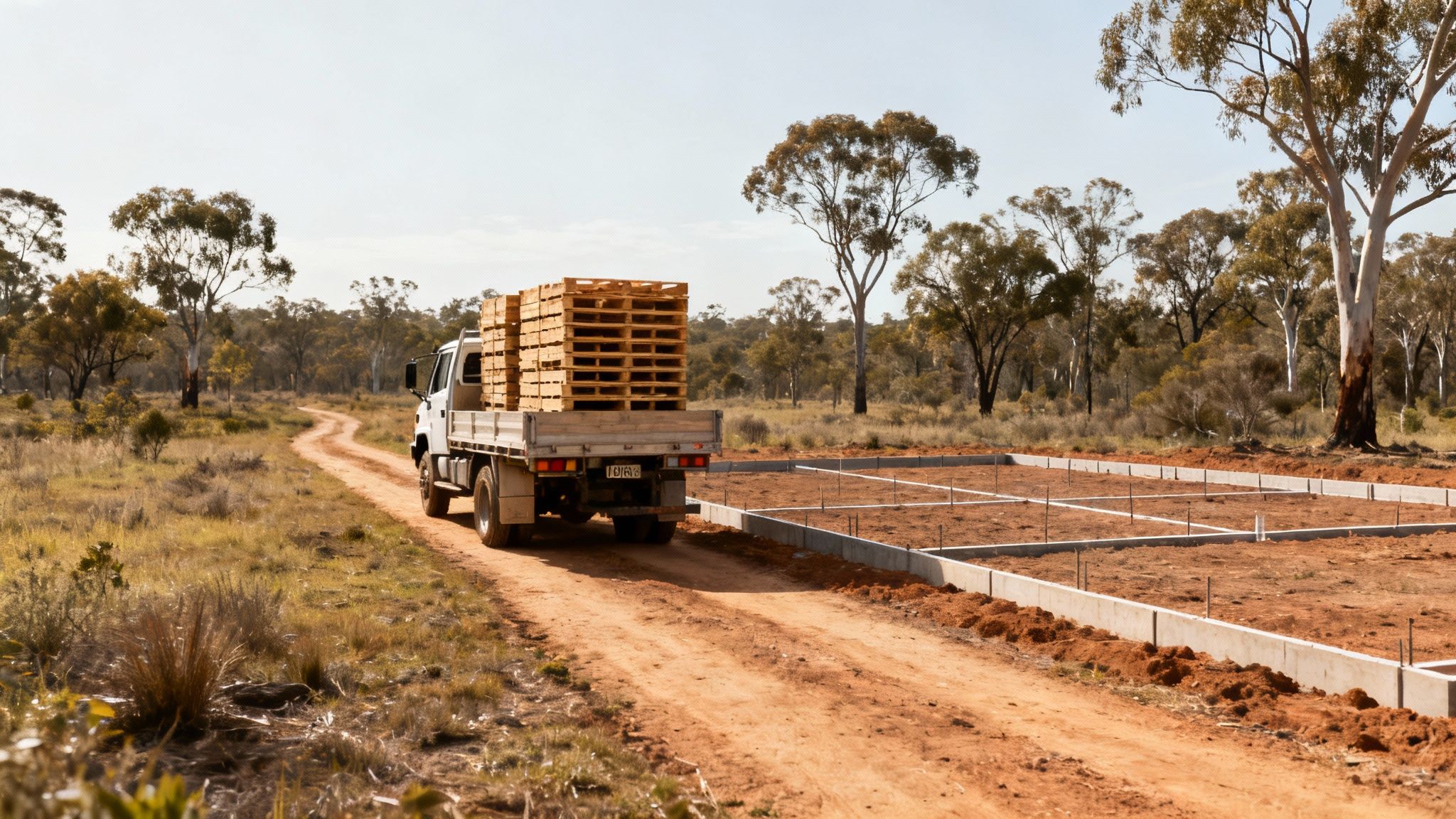
Choosing a builder for a project out in rural New South Wales is a completely different ball game. The challenges you'll face aren't the tight blocks and neighbourly disputes of the city; they're baked right into the landscape itself. Forget about easy kerbside access or flicking a switch for utilities. Success out here depends on finding a builder who can see the hurdles coming—rough terrain, environmental rules, and the simple, brutal reality of distance.
A builder who truly gets the bush doesn't just put up a building; they deliver a whole solution. They know what your property will throw at them and have the right gear and real-world experience to handle it without wrecking your budget. This kind of specialised know-how is every bit as critical as their building licence.
Overcoming Site Access and Logistics
Often, the biggest headache is the most basic one: just getting to the site. Unsealed tracks, soggy creek crossings, and steep pinches are part of the package on many rural properties. A builder rocking up in a standard ute might find themselves stuck before a single hole is dug.
This isn't just a small delay. It’s a major logistical problem that can stop a project dead in its tracks. When materials don't arrive, crews are left standing around, progress stalls, and costs start to climb. You have to ask a potential builder not just if they can do the job, but precisely how they plan to get people and materials onto your block, day after day.
We have a 10 tonne 4×4 truck to bring in materials and supplies for the most remote properties around New South Wales, allowing us to bring in labour and materials where and when it's needed the most. It's not just a vehicle; it's our guarantee that we can get everything to your site, no matter how rough the track gets.
Having this kind of capability takes a huge risk off the table. It gives you confidence that your project won't be derailed by a bogged delivery truck or an impassable road after a bit of rain.
Navigating Services and Environmental Factors
Beyond just getting there, rural builds come with their own unique set of infrastructure and compliance puzzles. You can't just assume power, water, and sewerage are a simple hook-up away.
A builder with genuine rural NSW experience will know the ropes when it comes to:
- Essential Services: They can walk you through connecting to mains power (if you're lucky enough to have it nearby) or, more likely, planning for off-grid solutions like solar and generators. The same applies to water supply from tanks or bores and wastewater management via septic systems, all of which have their own council regulations.
- Bushfire Attack Level (BAL) Ratings: If your property is in a bushfire-prone area, its BAL rating will dictate strict, non-negotiable building standards. This impacts everything from the type of glass in your windows to the timber on your deck. A seasoned rural builder has these requirements down pat.
- Council Approvals: Working through local council rules for rural structures can be a maze. For instance, you might think a basic farm shed is a simple affair, but knowing the specific requirements can save you a world of pain. We cover this in more detail in our guide on whether you need council approval for a shed in NSW.
Ultimately, picking a builder is about finding a partner. You need someone who is not only a great craftsperson but also has the proven expertise to manage the unique environmental and logistical challenges of building in the bush. How well they handle these issues is the truest test of how smoothly your project will run.
Your Questions Answered: Choosing a Builder
When you're figuring out how to choose a builder, a lot of questions pop up, especially for projects on rural or regional properties. Getting solid answers is the only way to feel confident moving forward. Let's tackle some of the most common queries we get from landowners across New South Wales.
These aren't just random questions; they touch on critical moments in the building process, from sorting through quotes to dealing with hiccups along the way.
How Many Quotes Should I Get?
You should aim for three detailed quotes from builders you've already checked out thoroughly. Why three? One quote gives you nothing to compare it to, and two can just be confusing if they're wildly different. Three gives you a reliable benchmark for what your project should cost and how long it should take, without drowning you in paperwork.
The real key here is to make sure every builder is quoting on the exact same set of plans and specifications. You can't compare apples with oranges. If one quote comes in way cheaper than the others, it's your job to dig in and find out why. It could be a red flag for missed details or lower-quality materials.
What’s the Difference Between a Builder and a Project Manager?
Think of a builder as the hands-on professional who physically constructs your project. They're on-site, managing the tradies, ordering materials, and making sure the work is up to scratch.
A project manager operates at a higher level, overseeing the entire process. They might help you find and hire the builder, manage the budget, and essentially act as your representative. For most home builds, a good builder handles both roles perfectly well. However, on really large or complex rural projects, some people hire an independent project manager for an added layer of oversight.
What Should I Do If a Dispute Arises with My Builder?
Even with careful planning, disagreements can happen. Your very first move should be to pull out your building contract and read the dispute resolution clause. It's there for a reason.
Next, talk to your builder. Clearly explain your concerns, and always follow up in writing to keep a paper trail. A straightforward chat often clears up minor issues right away. If you’re still stuck, NSW Fair Trading offers a formal mediation service for homeowners and builders. This is an incredibly valuable step to take before even thinking about legal action—it can save you a massive amount of time, stress, and money.
No matter the question, clear communication and a solid contract are your best tools. A professional builder will welcome your questions and provide transparent answers, ensuring you feel secure and informed every step of the way.
One last thing to think about, and it's a big one for rural builds: logistics. You have to ask a potential builder how they plan to get materials to your site on time, particularly if you're off the beaten track. We have a 10 tonne 4×4 truck to bring in materials and supplies for the most remote properties around New South Wales. This allows us to bring in labour and materials where and when it's needed the most, avoiding the access problems that can completely derail a project.
Ready to partner with a builder who understands the unique demands of rural NSW construction? The team at Awesim Building Contractors has the experience and equipment to bring your vision to life. Contact us today to discuss your project.

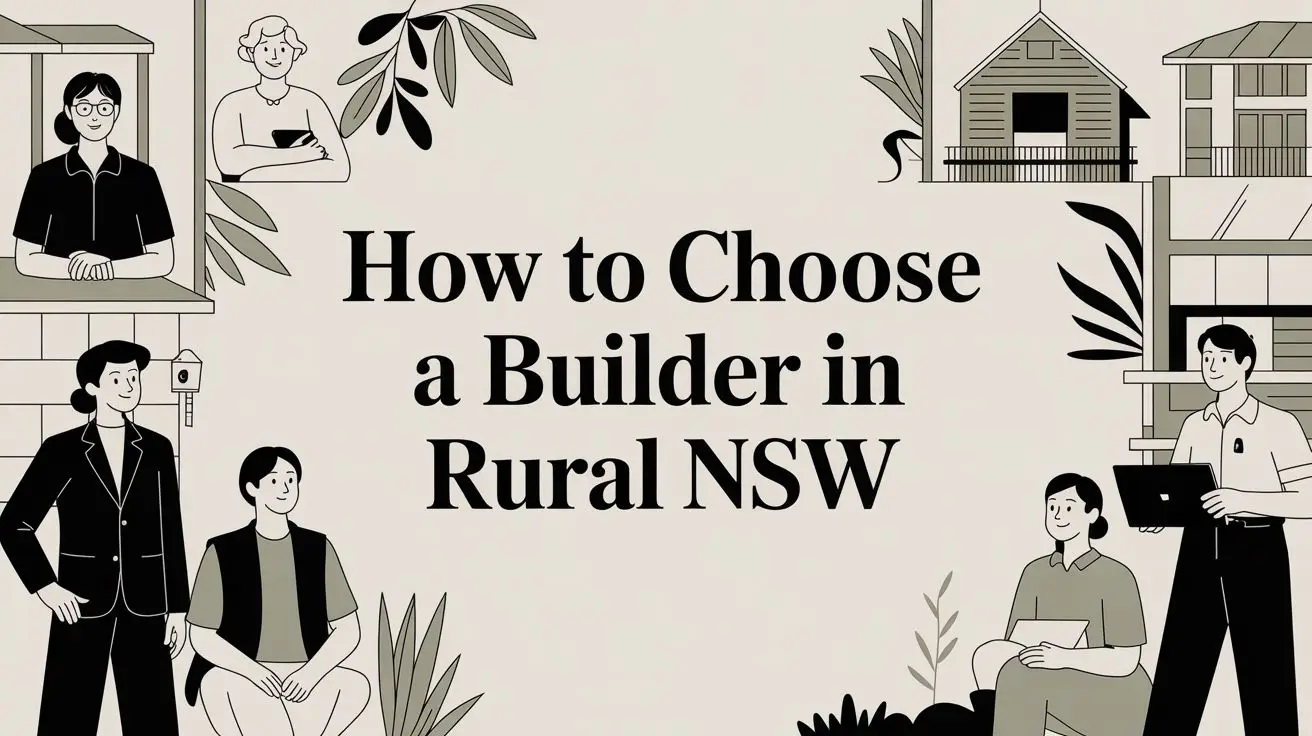
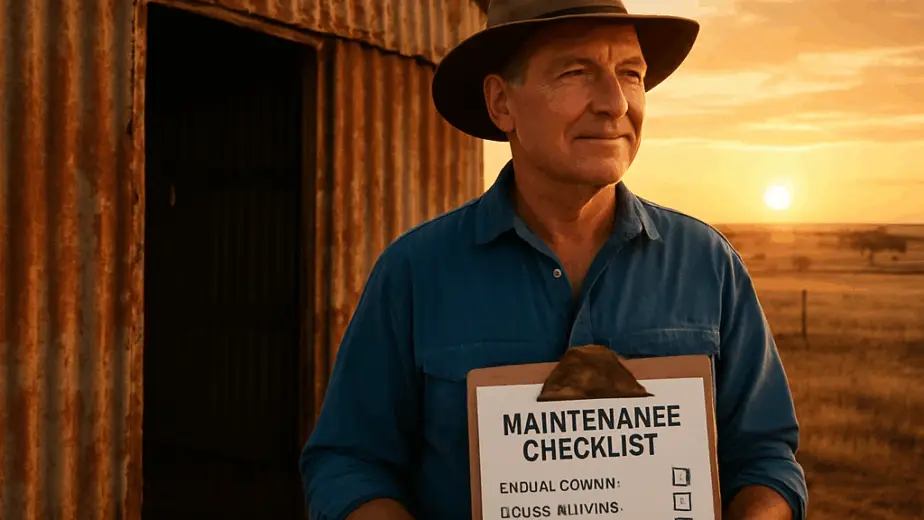
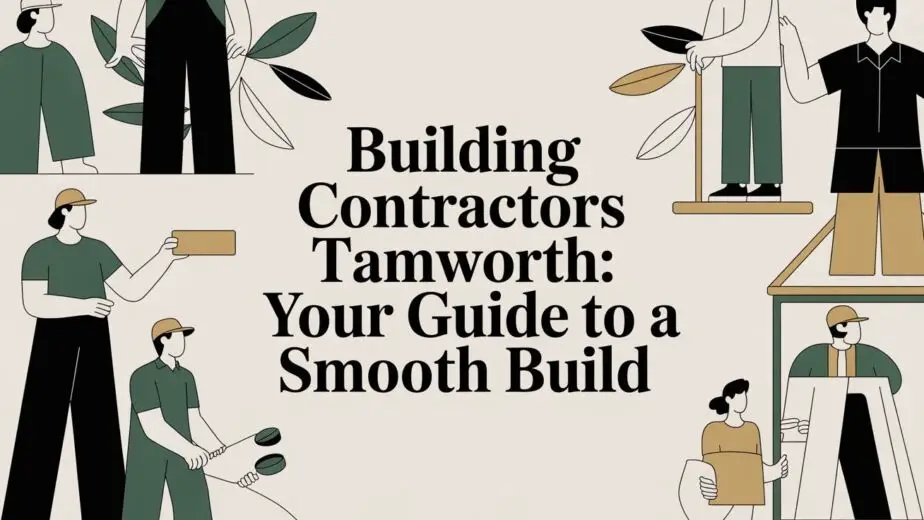
4 Comments